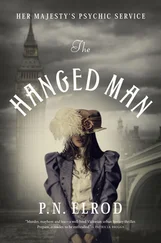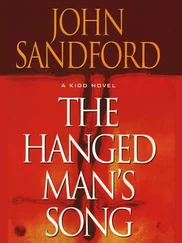“Actually, I’m not Mr. Sands. I’m Leonard English, I’m just the assistant. I’m the one you talked to on the phone yesterday.”
“Oh. I thought you looked awfully young. I’d understood Mr. Sands was retired, and I — naturally—” At the door of the last room, she held him off. “And where is Mr. Sands?”
“Taken ill. He’ll be going over the information and planning my moves.”
“Good.”
“I stopped by the address you gave Mr. Sands,” he told her. “The lady next door hasn’t seen him lately. But she says somebody’s come by once or twice — a man, she said. And there’s no mail in his mailbox.”
“I have his mail,” Mrs. Twinbrook said. “Gerald’s been picking it up — Gerald Senior, my husband. There’s not much.”
“If you don’t mind, I’d like to take a look at it. I don’t know, return addresses might tell us something.”
“Of course. Remind me before you go.”
Now was the time to start asking questions, but he couldn’t bring the words out.
“This is my son’s studio. He works here a couple of days each week.”
It was small and looked more a place of storage than a place of work. Paintings, most of them no larger than dinner trays, were stacked against the walls, and above them hung more paintings. Cardboard boxes filled with rags and paper, and paint-smeared glass jars, each with a shock of brushes, cluttered the floor. There was hardly anywhere to stand or walk. The big window gave it all a sense of light and space that was false — an element of dust, a museum quality, lay on the air. By the window stood a large collapsible table with drawings and pencils all over it.
“Does he actually paint here?” English was sidestepping objects to get to the table, but he was distracted by the paintings hanging on the walls on either side of him. Now that he was in the room, a tincture of oils took hold of his breath. “Did he do these pictures in this room?” One of the paintings suggested Miami Beach, as English imagined that place, with tall buildings overlooking a shoreline blotched with umbrellas.
With every further statement, he felt his next one would be a confession of his complete inability to know where to begin.
“Jerry paints outdoors,” Mrs. Twinbrook said. “I believe he sketches in here, or rethinks portions of his canvases. He’s very, very meticulous. He believes in the absolute power of detail. I want you to look at this man’s elbow.” She laid a coral fingernail against the brown flesh of a sunbather in the scene he’d been studying. All the figures were simply rendered. To English the elbow looked like the joint of a stove pipe. There were no faces on this beach. The half-dozen bathers in the foreground were all looking away. “That elbow is leaned on, wouldn’t you have to agree?” The man reclined in an oval of umbrella shade, his maroon bathing suit slashed by the sunshine.
English was at a loss when it came to elbows, but he had no trouble recognizing, in some of these paintings, the eerie Cape light. On overcast days the sun might be just a brighter patch in a grey sky, but its effect would smolder anyway on the hills and occasional white buildings of the countryside and on the water, so that the world seemed to lie straight under a blowtorch; and yet things cast no shadows. English had guessed that the light collected somehow on the waters and made a brightness in the air, even under clouds — just in the air, a brightness not otherwise locatable. Jerry Twinbrook had caught that light and let it fall through these paintings. “I’ve been to this place.” English pointed at the two landscapes flanking the one of Miami Beach. “Herring Cove, right? Just outside P-town.”
“You see,” she said.
English could only nod. See what? He was supposed to be asking questions, but she expected him to pay attention to this stuff first. He felt sorry for Mrs. Twinbrook, because she looked, by her clenched interest in this room, like bricked-over despair. She herself had the same black-and-white quality as her walled back yard. Her turtleneck sweater was thick and snowy, but her hair was a shining, artificial black and her skin was dark — as a matter of fact, it came to English, she was suntanned.
“I’m just taking all this in.” He tried to sound like an expert, a genius of the faintest trails. “Now, these look like they were painted indoors.” At the level of his knees, various interior scenes leaned against the walls. He saw what she’d meant about elbows — the people in these somber pictures were mysterious, seated around tables or standing in doorways, and they had no faces, only blank ovals, but in the way they held their bodies the people were alive.
English looked at the drawings on the table, carefully moving each one from on top of the others so as not to smear them or disturb something — evidence maybe. He wasn’t a judge of art, but these seemed to be only doodles, geometrical shapes scratched on rough heavy paper, studies of chairs and torsos, practice at the cast of a shadow or the angle of a view. None of it was information. He was wasting her money as he handled these sketches. And yet he felt a prickly discomfort, as if he were learning more than he wanted to know about this lost person.
“You see,” Mrs. Twinbrook said, as if English would grasp what eluded her husband, “my son has a gift.”
Her husband had been driving away just as English had arrived, and he’d paused only long enough to give English an impression of a pink, shaven face as he’d rolled down the window of his Lincoln to say, “Are you the detective?” English had gotten out of his Volkswagen and started across the gravel driveway toward him, but already Mr. Twinbrook was rolling up his window. “He can’t paint and he’s probably good for nothing, but we love him. Find him.”
“I will,” English had said. I can’t, he had thought.
Once back in Provincetown, English parked his Volkswagen behind his building and walked along Commercial, toward his bank, before he returned to Ray Sands. On the darkening street, where lamps were starting to take over the business of making things visible but where a little daylight clung to the air, English watched two boys going home late from school. It was almost Valentine’s Day, but Halloween was what they were talking about, and one of them suddenly tossed down his books and raised his arms to demonstrate, for the other, how big a pumpkin had been. This pantomime had a curious effect on English — he was amused and heartbroken, watching this kid posing like a ballerina, making a circle the size of a lonely vegetable with his empty arms. The wind blew out to sea, and the air was cold and fresh and so vacant that every object, even the pumpkin that wasn’t really there, stood out boldly and seemed to mean something. You are here, he said to God, and then from nowhere came the hope that he was wrong, that the grain of wooden phone poles and the rough stones of the courthouse were taking place on their own, and that nothing would ever be asked of him.
“English! Leonard English!”
It was Berryman hailing him, hanging out the door of a café. “Let me treat you to a coffee and pie! I’m a working man!” The voices of chilly patrons behind him called, “Close the door! Shut the door!”
English was happy for Berryman. “Who made the mistake of hiring you?”
“The archrival — our weekly newspaper.” Berryman, for once, looked more alive than dead. He guided English along a path through crowded tables to a booth in the rear. “It’s all different nowadays. I load the copy into a word processor. I’m setting the type as I write the story.” His eyes were clear; on top of being cheerful, he was sober. “I’m a technologically advanced human being,” he said without irony. It was as if his cynicism had crumbled to powder and drifted out of his nature.
Читать дальше












